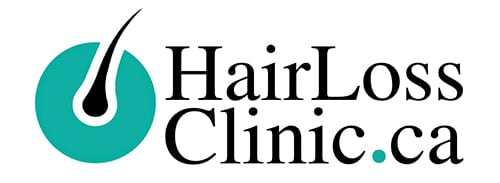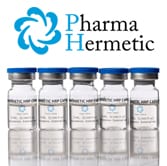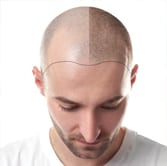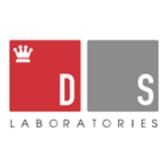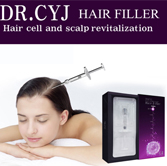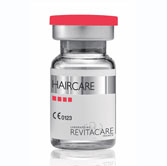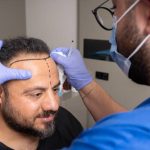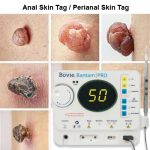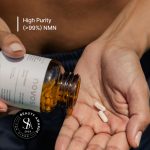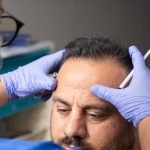
ALOPECIA TOTALIS | CAUSE & TREATMENT | HAIR LOSS CLINIC TORONTO
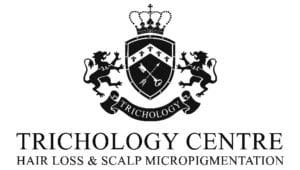
FREE ONLINE HAIR LOSS ASSESSMENT FORM
Are you experiencing any hair loss or scalp issues? Get a Certified Trichologist to assess and help treat your condition in Toronto and Greater Toronto Area. Please complete our online Trichology Assessment Form to get started now.
What is Alopecia Totalis?
Alopecia totalis is characterized by a loss of hair to the entire scalp. It is an advanced form of Alopecia Areata which is the more common of the two. Alopecia totalis affects about 1 in 2,000 thousand people, making it a rare skin disease. It is a non-scarring alopecia without the complete destruction of the hair follicle. Hair regrowth can be expected as the hair follicles are not destroyed like scarring alopecia (cicatricial alopecia).
Alopecia totalis is an intermediary stage in between alopecia areata and alopecia universalis. Alopecia areata is an autoimmune disease that causes hairs to fall out in small coin size patches. Alopecia universalis is the complete hair loss to all parts of the body. Although alopecia totalis affects the whole scalp, hair loss to the eyebrows and eyelids can also be affected.
Alopecia totalis can vary between individuals. The most evident symptom is excessive hair loss of the scalp. Few people experience itching and discomfort like tightness on the scalp, while others may exhibit no symptoms at all. Sometimes there is sudden and rapid hair loss. It usually progresses in two forms, beginning with thinning of hair that eventually progresses to bald patches as in alopecia areata or it can occur suddenly, and the patient can experience complete scalp hair loss in a short period of time.
Alopecia is unpredictable. While some people respond to treatment and regrow their hair, there’s also the risk of alopecia totalis getting worse and progressing to become alopecia universalis. You could begin to lose hair on other parts of your body, including your nostrils, underarms, legs, arms, and groin area.
Alopecia Totalis affects both men and women, young and old, although it is more prevalent in men and people under the age of 40, including children.
Alopecia totalis is assessed after a careful examination of the head and scalp. The examination gives an understanding of the hair loss pattern. A complete medical and lifestyle history of the patient is studied by a Trichologist. He may recommend a biopsy of the scalp and get a blood work.
What Causes Alopecia Totalis?
Although the causes are unclear, it is believed to be caused by an autoimmune disorder. The immune system attacks the hair follicles, perceiving it as a threat, and causing inflammation and hair loss.
Genetics plays a key role in developing alopecia totalis. One in five people who has alopecia areata also has a family member who has experienced the same condition. Recent research says that people with certain specific genes are more likely to develop the disease.
What is the best treatments for Alopecia Totalis?
Prescription and nonprescription treatments are available for alopecia totalis. Although there is no cure, some treatments may help with the condition. The odds of a positive outlook are higher the earlier you begin treatment for this condition. Medical prescription treatments may have unwanted side effects.
At the TRICHOLOGY CENTRE, we believe there are better alternatives for treating alopecia areata that don’t have the negative side effects associated with certain prescribed drugs. For those patients, who want to opt for a more natural course of treatment, please contact the Trichology Centre at 647-492-9093 for a hair and scalp consultation and learn more about our non-prescribed hair loss treatments.
Medical Prescription Treatments for Alopecia Areata
Diphencyprone (DPCP)
DPCP is a topical treatment helps stimulate hair follicles and promotes hair growth. It was designed to stimulate an allergic reaction, which prompts an increase in white blood cell count, stimulating hair growth.
Side Effects: Side effects associated with topical immunotherapy using DPCP include eczema, hyperpigmentation, hypopigmentation. Some patients may experience severe burning, itching, blistering or swelling of treated areas. As diphenylcyclopropenone is most often applied to the scalp, the reaction may make wearing headwear or wigs uncomfortable. Swollen lymph nodes may be noticeable behind the ears.
Minoxidil (Rogaine)
Minoxidil is an antihypertensive vasodilator. It is commonly used to treat male pattern baldness. For best results, use this medication in conjunction with other therapies. Hair may begin to regrow within three months.
Side Effects: Side effects associated with Minoxidil include severe scalp irritation, unwanted growth of facial hair, chest pains and/or fast heartbeats, swelling in your hands and feet, flushing, headache, dizziness, confusion, unusual weight gain.
Corticosteroids
Corticosteroids helps stop the immune system from attacking healthy tissue. As a result, you may notice less hair loss. You may begin to regrow hair in affected areas.
Side Effects: Side effects of corticosteroids used on a long-term basis (longer than 3 months) include: osteoporosis, diabetes, hypertension, weight gain, thinning of the skin, bruising easily, increased vulnerability to infection, cataracts and glaucoma.
Tofacitinib (Xeljanz)
This new therapy, originally developed for rheumatoid arthritis, shows significant promise in treating the many forms of alopecia areata.
Side Effects: Severe stomach pain, yellowing of the skin or eyes, vomiting, clay-coloured stools, dark-coloured urine, pale skin, skin rash, shortness of breath.
Nonprescription Treatments for Alopecia Totalis
Micronutrients
The role of diet and nutrition to help treat alopecia areata is growing. New evidenced-based recommendations that micronutrients including certain vitamins and minerals have shown positive results. Micronutrients can reduce oxidative stress, an increasingly suspected contributor to alopecia areata. Vitamin D have shown to help modify the immune response by inhibiting Th1 cell proliferation. Current literature has consistently demonstrated lower vitamin D levels in patients with alopecia areata.
Biotin – Biotin is an important coenzyme for carboxylation reactions. Biotin deficiency has been shown to cause hair loss.
Iron or ferritin – Iron deficiency remains the most common nutritional deficiency in the world, a sign of which includes chronic diffuse telogen hair loss.
Vitamin D – Vitamin D boosts immunity, keeps bones strong and skin healthy, stimulates cell growth, and helps create new hair follicles. Vitamin D deficiency has been linked to alopecia areata.
Zinc – Zinc is an essential mineral upon which hundreds of enzymes depend for their catalytic activity.
Vitamin C – Vitamin C is a powerful antioxidant that helps protect against the oxidative stress caused by free radicals. It also helps your body absorb iron, a mineral necessary for hair growth.
Vitamin A or retinoid or retinol – Vitamin A is an essential vitamin for hair follicles. It also helps skin glands make sebum. Sebum moisturizes the scalp and helps keep hair healthy.
Magnesium – Magnesium acts as a cofactor for over 300 enzyme systems, and plays an important role in nucleotide synthesis, a frequent process in the rapidly dividing hair follicle.
Vitamin E – Like vitamin C, vitamin E is an antioxidant that can prevent oxidative stress. In one documented study, people with hair loss experienced a 34.5% increase in hair growth after supplementing with vitamin E for 8 months.
Vitamin B12 or cobalamin – B12 contribute to nucleic acid production and thus possess an important role in the health of the hair follicles.
Selenium – Selenium also contributes to antioxidant defense mechanisms via its interaction with the enzyme glutathione peroxidase.
Folic acid or folate – Folic acid is primarily responsible for healthy cell growth including the cells in hair follicles.
Copper – copper acts with zinc in the antioxidant enzyme copper/zinc superoxide dismutase
Adding certain vitamins and minerals can help promote hair growth and nurture the hair follicles and scalp. Speak with a certified Trichologist on the best dietary, vitamins and minerals to help you with alopecia areata.
Cosmetic solutions to Alopecia Totalis
SMP Scalp Micropigmentation is a popular cosmetic solution for alopecia areata. If your condition persist and hair is not growing back fully, you may consider SMP to camouflage the bald spots. SMP, commonly known as hair tattoo, the technique of placing individual pigment tattoo to replicate the appearance of real hair follicles. For more information about scalp micropigmentation, please visit Here
Mesotherapy solutions for Alopecia Totalis
SMP Scalp Micropigmentation is a popular cosmetic solution for alopecia areata. If you condition persist and hair is not growing back fully, you may consider SMP to camouflage the bald spots. SMP, commonly known as hair tattoo, the technique of placing individual pigment tattoo to replicate the appearance of real hair follicles. For more information about scalp micropigmentation, please visit https://hairtattoo.ca.
Mesotherapy solutions for alopecia areata
Mesotherapy is a technique that uses injections of vitamins, enzymes, hormones, and plant extracts to rejuvenate the scalp and hair follicles.
PHARMA HERMETIC HAIR RECOVERY PROGRAM®
Pharma Hermetic Hair Recovery Program® works at revitalizing the hair bulb and obtaining a greater thickness and strength. It helps strengthen the anchorage of the root and rebalance the scalp.
In addition, the Hair Recovery Program® SP55, enhance the growth of new hair and activates dormant follicles thanks to its effective active ingredients. Providing all the necessary nutrients to repair the weakened and brittle hair. After the treatment, the hair becomes thicker and more voluminous.
We rely on ingredients suitable to penetrate the scalp and stop hair loss.
- Thicker hair.
- More density.
- No side effect.
- Topical application.
- Lasting results.
AAPE® STEM CELL THERAPY
AAPE® (Adipose-derived stem cells Protein Extracts) is a mixture of refined growth factors extracted from human adipose to promote hair growth and scalp health using outstanding ingredients approved by US FDA and CFDA. AAPE has been proven to be highly effective therapy for hair regeneration. For more information about AAPE visit Here
THERADOME® LASER HAIR THERAPY
The Theradome® brings you the world’s most advanced laser hair growth treatment to enjoy from the comfort of your own home. Unlike Light Emitting Diodes (LEDs) devices, our laser light targets the stem cells at the base of hair follicles. This allows the formation of a new photonic pathway that can restore hair to a healthy state. Theradome® one-of-a-kind laser hair helmet was engineered based on four crucial scientific criteria, which together provide the most powerful and efficacious laser hair growth treatment available. For more information about Theradome®, please visit: https://laserhairtherapy.ca.
With the numerous available treatments for alopecia areata our Trichologist can recommend the best treatment that can help with alopecia areata. At Trichology Centre, we have helped patients with alopecia areata, advising them the best treatments available and helping them regain their confidence and self-esteem.
NOURKRIN® MAN AND WOMAN HAIR LOSS
If you’re worried about certain hair loss medications that contain ingredients that may cause some side effects such as Minoxidil, we offer a hair loss treatment called Nourkrin®. Nourkrin® contains natural ingredients and has been clinically proven to help thinning hair. The key active ingredients are marine-based extracts of proteins and polysaccharides that have been combined with silica, vitamin C, and horsetail extract. Developed by scientists in Finland, Nourkrin® has been the subject of many double blind, placebo-controlled clinical studies, the latest of which showed that 77% of all participants reported a positive effect during a six-month treatment period and their hair count increased by an average of 35.7%.
The prognosis of Alopecia totalis is uncertain. In individuals who developed alopecia totalis and have recovered, the disease may return. Since it’s difficult to treat, spontaneous re-growth of hair is seldom and there is a high possibility that it will relapse. The recovery rate for Alopecia totalis is low. The usual period of the disease is two years. Early assessment and treatment from the onset of hair loss is important and can help prevent the condition to worsen.

FIND A TRICHOLOGIST IN TORONTO GTA
With the numerous available treatments for alopecia totalis our Trichologist can recommend the best treatment that can help with this condition. At the Trichology Centre, we have helped patients with alopecia totalis, advising them the best treatments available and helping them regain their confidence and self-esteem. Early assessment and treatment from the onset of hair loss is important and can help prevent the condition to worsen. Please fill out the initial trichology assessment form here: https://hairlossclinic.ca/trichology-assessment-form/ to get started.
We have two clinics in the Toronto GTA,
TRICHOLOGY CENTRE | hairlossclinic.ca | hairtattoo.ca | laserhairtherapy.ca
225 Wellesley St E, Toronto
9140 Leslie St, Richmond Hill.
Please give us a call at 647-492-9093
ADDRESS
Toronto, 225 Wellesley St East #5
Richmond Hill, 9140 Leslie St #301
PHONE
(647) 492-9093
hairlossclinic.ca@gmail.com
WORKING HOURS
Mon-Sat 10:30 am - 8:00 pm
Sunday CLOSED
Comments are closed.
